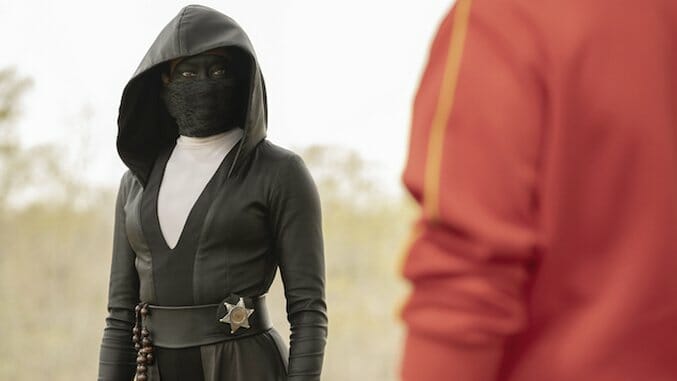HBO’s Engrossing Watchmen Series Grapples with America’s Past and Its Own
Photo Courtesy of HBO
Alan Moore and Dave Gibbons’ graphic novel Watchmen, like Fight Club and Starship Troopers, has a knack for getting itself misunderstood. Frankly, that’s mostly because white guys in the demographic that usually watches this kind of thing are used to a certain kind of messaging and a certain status quo interpretation. Action heroes kill stuff. It’s awesome. Rah, rah, violence. Move along, see the sequel in a year. Past behavior is hard to escape; it’s also hard to criticize without accidentally dipping back into old habits. Watchmen’s HBO sequel series from Damon Lindelof isn’t perfect in this regard, but it’s easy to watch, tough to pin down, and well worth working through.
It takes place three decades since everything went down with Rorschach, Doctor Manhattan, and Ozymandias’ giant space squid. Racist Seventh Kalvary terrorists don Rorschach masks and attack cops like Angela Abar (Regina King) en masse, leading to police in Tulsa protecting their identities with masks of their own. Adrian Veidt (Jeremy Irons) a.k.a. Ozymandias, is MIA while Laurie Blake (Jean Smart) a.k.a. Silk Spectre, is now an FBI agent.
They’re not the only familiar references from the comic. The striking use of color—like the bright yellow masks worn by Tulsa PD that match a certain ubiquitous smiley face’s hue—music, and speculative pop culture find adaptive fidelity here, as do some of the comic’s wonky framing stories. The show opens with the 1921 Tulsa Race Massacre that torched Black Wall Street, a set piece pulled off with sweeping, brutal effectiveness. It leaves two children alive and viewers prepared for this show to go hard on racial injustice. And it does … eventually. Early steps forward are pushed diagonally by choices that initially seem tone-deaf, like how, for example, the first episode ends with a white man’s surprise death by lynching.
But it mostly pays off. This murder serves as a mirror to that of The Comedian in the original—a simple instigation that gets messy fast. And things get messy. The FBI sends Blake while Abar tries to solve it on her own terms, and much larger machinations happen behind the scenes. Plotting that revels in asides, references, metaphors, and symbolism is alternatively rich, bewildering, trite, and ballsy. The wide ensemble’s storylines are rarely boring, but sometimes that’s because you’ll be saying “Wait, what the fuck is going on?” Sometimes that’s necessary for a mystery to work; sometimes it’s because the show isn’t sure what it wants to say.
The Kalvary, more on-the-nose as a neo-KKK than the actual alt-right, is given ulterior motives and a radicalization scheme based in conspiracy … which is way too much credit for an analogue to present-day alt-right, considering the conspiracy is canonically true. The first cops we see are black, including Abar. Clad in black leather and a mask, she nabs and tortures whomever her fellow police need. It’s fascists against fascists in this fraught pseudo-grey world. It’s also made even less palatable to be set in Tulsa, where in reality the police force allowed an elderly white donor to the sheriff’s reelection campaign to murder an unarmed black man while he was subdued and on the ground in April of 2015. In October of 2015, HBO began preliminary discussions about Watchmen. Other than this knowledge, my status as a former Tulsa-area resident isn’t very useful (except to note that Oklahomans never talk about Oklahoma).
However, anyone living in America will be familiar with the alt-present Watchmen envisions. A series of jaded cops, each more fed-up than the last, navigate a world of militant racists with militant means of their own. “Do you know how to tell the difference between a masked cop and a vigilante?” asks Blake. Abar doesn’t. “Me neither.” The series loves to traffic in provocative duality, like the line between accountability and safety. Those provocations may give Smart plenty of sass to sink her teeth into, but seems disingenuous considering the show’s ambitious thematic center.
The show becomes more and more about the traumas suffered by our progenitors, how they’ve lived on through us, and how we respond to their effects. It susses out the ways the government would attempt reparations for black Americans robbed of historical wealth—including the racist backlash against and cringe-inducing videos used to inform those receiving them. This applies to oppression and inequality, sure, but an entire episode digs into the 9/11-like aftershocks resonating into the American psyche from Ozymandius’ space squid drop on NYC. The past comes for everyone in the show.
-

-

-

-

-

-

-

-

-

-

-

-

-

-

-

-

-

-

-

-

-

-

-

-

-

-

-

-

-

-

-

-

-

-

-

-

-

-

-

-








































